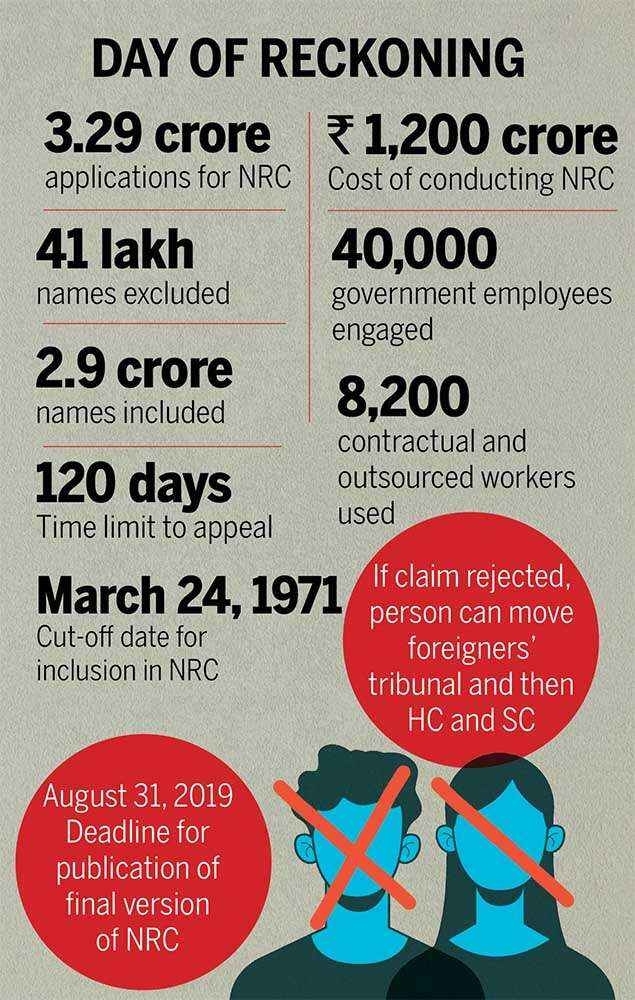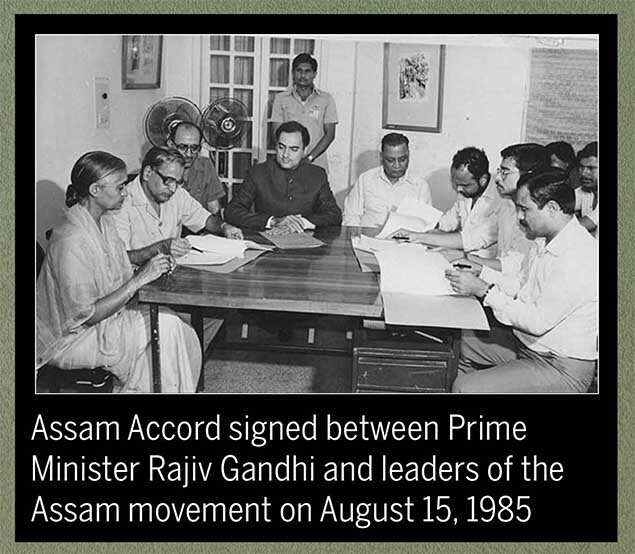The National Register of Citizens (NRC) was released on Saturday following a Supreme Court deadline of August 31 for its publication. NRC is a list of Assam's residents – prepared to identify bonafide residents and deport illegal migrants in the northeastern state bordering Bangladesh. About 19.07 lakh names were excluded from the final register, while names of 3.11 crore people were included.
Why August 31 deadline is important
In the run-up to the four-year-long SC-monitored exercise's culmination, anxiety levels were mounting. About 40.7 lakh names were excluded from the draft NRC released on July 31 last year. This increased to over 41 lakh names after an 'additional draft exclusion list' that dropped another one lakh names was published on June 26, 2019. Some 2.9 crore people out of a total 3.29 crore applicants were included in the NRC. For those who don't make it to the final list, a long and tough battle lies ahead where they will have to prove they are legal Indian citizens.
What gets you on the list?
To make it to the current list, names of family members of the applicant should be in the first NRC prepared in 1951 or in the electoral rolls up to March 24, 1971. Other documents include birth certificate, refugee registration certificate, land and tenancy records, citizenship certificate, permanent residential certificate, passport, LIC policy, government issued licence or certificate, bank/post office accounts, government employment certificate, educational certificate and court records.
The Assam Accord of 1985 formalised March 24, 1971 as the cut-off date to identify "foreigners" in the state as the Bangladesh Liberation War began the next day. But considering India's poor documentation culture, many genuine citizens have been unable to furnish the required documents.
 Image Source - TIMES OF INDIA
Image Source - TIMES OF INDIA
What happens if you are excluded?
The Union home ministry has clarified that "non-inclusion of a person's name in the NRC does not by itself amount to him/her being declared a foreigner" as the person will be allowed to present his/her case before designated foreigners' tribunals. The state government has also said that those left out of the NRC will not be detained "under any circumstances" until the foreigners' tribunals declare them foreigners.
Foreigners’ tribunals, promised under the Assam Accord, are quasi-judicial bodies that exclusively adjudicate matters of citizenship. Those who have been declared foreigners by tribunals are not eligible for inclusion in the NRC. In case a person is included in the NRC but declared a non-national by a tribunal later, it is the tribunal’s verdict that will prevail.
According to Assam chief minister Sarbananda Sonowal, the Centre may consider bringing in legislation to set right wrongful inclusions (of foreigners) and exclusions (of genuine citizens) on the list. However, this measure, if warranted, will take place only after the NRC is published.
Where to appeal?
Appeals can be made under Section 8 of Schedule to the Citizenship (Registration of Citizens and Issue of National Identity Cards) Rules, 2003. The time limit to file an appeal has been increased from 60 days to 120 days – till December 31, 2019. A total of 1,000 tribunals have been sanctioned by the home ministry. If one loses the case in the tribunal, the person can move the high court and, then, the Supreme Court. No one will be put in detention centres until all legal options are exhausted, the government has stated.
The Assam government has said it will provide free legal aid to 'needy' people whose name does not figure on the list. The state's ruling BJP and opposition Congress also plan to 'assist' bonafide citizens who are kept out of the NRC. NGOs too have volunteered to navigate the complex issue of Indian citizenship after August 31.
The state is setting up detention centres exclusively for those declared foreigners after exhausting all legal routes. Repatriation of such people looks difficult as India and Bangladesh do not have any treaty in this regard
First created in 1951, NRC is a list of Indian citizens in Assam. At the time, two other states in the northeast – Manipur and Tripura – were also given grants by the Centre to create their own NRCs, but it never materialised. Assam is presently the only state in India to have an NRC. The grounds then were the same as those now – “unabated” migration from East Pakistan (now Bangladesh). A year before the first NRC was released, the Immigrants (Expulsion from Assam) Act, 1950 was passed by the Centre, allowing the government to deport anyone whose stay was “detrimental to the interests” of the people. An exception was made only for those displaced by “civil disturbances” in what was then East Pakistan. The Act was repealed in 1957.
Appeals can be made under Section 8 of Schedule to the Citizenship (Registration of Citizens and Issue of National Identity Cards) Rules, 2003. The time limit to file an appeal has been increased from 60 days to 120 days – till December 31, 2019. A total of 1,000 tribunals have been sanctioned by the home ministry. If one loses the case in the tribunal, the person can move the high court and, then, the Supreme Court. No one will be put in detention centres until all legal options are exhausted, the government has stated.
The Assam government has said it will provide free legal aid to 'needy' people whose name does not figure on the list. The state's ruling BJP and opposition Congress also plan to 'assist' bonafide citizens who are kept out of the NRC. NGOs too have volunteered to navigate the complex issue of Indian citizenship after August 31.
The state is setting up detention centres exclusively for those declared foreigners after exhausting all legal routes. Repatriation of such people looks difficult as India and Bangladesh do not have any treaty in this regard
First created in 1951, NRC is a list of Indian citizens in Assam. At the time, two other states in the northeast – Manipur and Tripura – were also given grants by the Centre to create their own NRCs, but it never materialised. Assam is presently the only state in India to have an NRC. The grounds then were the same as those now – “unabated” migration from East Pakistan (now Bangladesh). A year before the first NRC was released, the Immigrants (Expulsion from Assam) Act, 1950 was passed by the Centre, allowing the government to deport anyone whose stay was “detrimental to the interests” of the people. An exception was made only for those displaced by “civil disturbances” in what was then East Pakistan. The Act was repealed in 1957.
What happens if you are declared a foreigner?
The history
Why the NRC update in Assam
When the NRC was first created, the idea was that it would be updated from time to time, just like the Census. But, that never happened. The NRC is basically an outcome of the All Assam Students’ Union's (Aasu) demand for removing the names of all illegal migrants from electoral rolls after a “rise” in the number of Bengali voters in Mangaldoi district in 1979 was noticed. The Mangaldoi episode led to a six-year-long anti-foreigner movement in Assam, culminating in the signing of the Assam Accord in 1985. Aasu and the Asom Gana Sangram Parishad (present-day Asom Gana Parishad) were the two main protagonists of the agitation. The accord, signed between the Centre, the Assam government and the agitators agreed to identify and deport all “foreigners” living in Assam. It identified March 24, 1971 as the cut-off date for identifying illegal migrants.
When the NRC was first created, the idea was that it would be updated from time to time, just like the Census. But, that never happened. The NRC is basically an outcome of the All Assam Students’ Union's (Aasu) demand for removing the names of all illegal migrants from electoral rolls after a “rise” in the number of Bengali voters in Mangaldoi district in 1979 was noticed. The Mangaldoi episode led to a six-year-long anti-foreigner movement in Assam, culminating in the signing of the Assam Accord in 1985. Aasu and the Asom Gana Sangram Parishad (present-day Asom Gana Parishad) were the two main protagonists of the agitation. The accord, signed between the Centre, the Assam government and the agitators agreed to identify and deport all “foreigners” living in Assam. It identified March 24, 1971 as the cut-off date for identifying illegal migrants.
 As the problem of infiltration from across the border persisted, in 2005, the signatories of the Assam Accord agreed to update the 1951 register to detect illegal non-nationals and settlers. Owing to a lack of consensus on modalities, the government took another five years to initiate a pilot project for NRC update, which was abruptly called off because of violent protests by students from the minority community. In 2013, the Supreme Court, in response to a series of writ petitions, ordered the Centre and the Assam government to resume the NRC update process. But, it was only after a wait of two years that the process finally started in 2015.
As the problem of infiltration from across the border persisted, in 2005, the signatories of the Assam Accord agreed to update the 1951 register to detect illegal non-nationals and settlers. Owing to a lack of consensus on modalities, the government took another five years to initiate a pilot project for NRC update, which was abruptly called off because of violent protests by students from the minority community. In 2013, the Supreme Court, in response to a series of writ petitions, ordered the Centre and the Assam government to resume the NRC update process. But, it was only after a wait of two years that the process finally started in 2015.
No comments:
Post a Comment